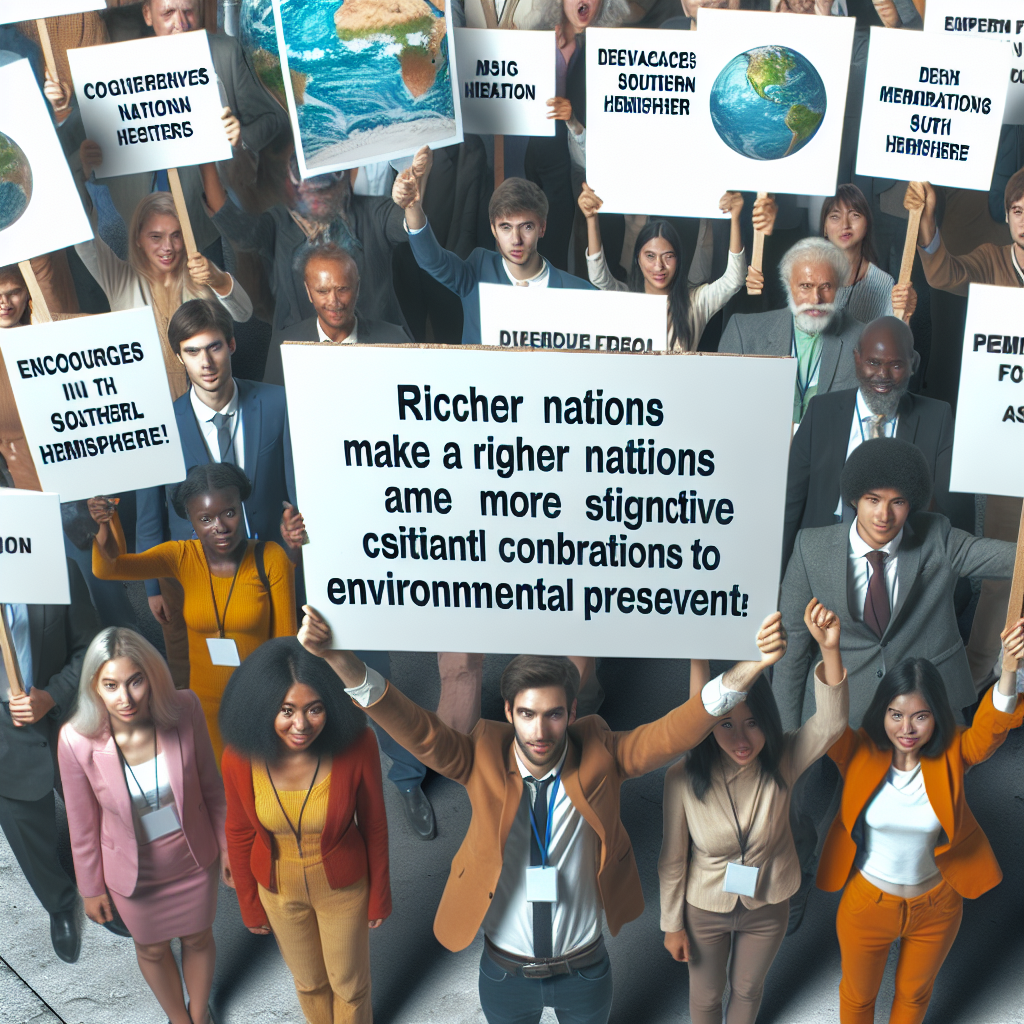COP29: A Call for Climate Justice – Rich Polluters Must Pay
As the world gears up for COP29, the annual United Nations Climate Change Conference, the spotlight is once again on the pressing issue of climate justice. Activists are raising their voices louder than ever, demanding that wealthy nations, the primary contributors to global pollution, take responsibility and pay their fair share. At the same time, there is a growing call for delegates from the Global South to stand firm and advocate for their rights and needs. This article delves into the dynamics of COP29, the demands of climate activists, and the pivotal role of Global South delegates.
Understanding COP29: A Crucial Turning Point
COP29, the 29th Conference of the Parties to the United Nations Framework Convention on Climate Change (UNFCCC), is set to be a landmark event. With the world facing unprecedented climate challenges, the conference serves as a critical platform for nations to negotiate and implement strategies to combat climate change.
What is COP29?
COP29 is part of a series of annual conferences where world leaders, policymakers, scientists, and activists come together to discuss and negotiate climate action. These conferences aim to assess progress in dealing with climate change and to establish legally binding obligations for developed countries to reduce greenhouse gas emissions.
Why is COP29 Important?
- Urgency of Climate Action: With rising global temperatures, extreme weather events, and biodiversity loss, the need for immediate and effective climate action is more urgent than ever.
- Global Cooperation: COP29 represents an opportunity for countries to collaborate and commit to ambitious climate goals.
- Focus on Equity: The conference highlights the need for equitable solutions that consider the disproportionate impact of climate change on developing nations.
Activists Demand Accountability from Rich Polluters
Climate activists are increasingly vocal about the need for wealthy nations to take responsibility for their historical and ongoing contributions to climate change. These countries, often referred to as “rich polluters,” have been the primary drivers of greenhouse gas emissions.
The Case for Climate Reparations
Activists argue that rich nations should provide financial support to developing countries to help them adapt to climate change and transition to sustainable energy sources. This concept, known as climate reparations, is gaining traction as a moral and ethical obligation.
- Historical Responsibility: Developed countries have historically contributed the most to carbon emissions, leading to the current climate crisis.
- Financial Capacity: Wealthy nations have the resources to support climate action in developing countries.
- Moral Obligation: There is a growing recognition of the ethical responsibility to address the disproportionate impact of climate change on vulnerable populations.
Key Demands from Activists
- Increased Climate Financing: Activists are calling for a significant increase in climate financing from developed countries to support mitigation and adaptation efforts in the Global South.
- Debt Relief: Many developing countries are burdened with debt, limiting their ability to invest in climate action. Activists are advocating for debt relief as part of climate reparations.
- Technology Transfer: Sharing technology and expertise is crucial for enabling developing countries to transition to sustainable energy systems.
The Role of Global South Delegates at COP29
Delegates from the Global South play a crucial role in shaping the outcomes of COP29. These countries, often the most affected by climate change, have unique perspectives and needs that must be addressed in global climate negotiations.
Challenges Faced by Global South Delegates
- Limited Resources: Many Global South countries lack the financial and technical resources to effectively participate in negotiations.
- Power Imbalances: The dominance of wealthy nations in climate negotiations can marginalize the voices of Global South delegates.
- Vulnerability to Climate Impacts: Developing countries are often the most vulnerable to climate change, facing severe impacts such as rising sea levels, extreme weather, and food insecurity.
Strategies for Effective Advocacy
- Building Coalitions: Forming alliances with other developing countries can amplify their collective voice and influence negotiations.
- Highlighting Vulnerabilities: Emphasizing the specific vulnerabilities and needs of their countries can help secure targeted support and resources.
- Engaging Civil Society: Collaborating with NGOs and civil society organizations can strengthen advocacy efforts and increase visibility.
The Path Forward: Achieving Climate Justice at COP29
Achieving climate justice at COP29 requires a concerted effort from all stakeholders. Rich polluters must acknowledge their responsibility and provide the necessary support to developing countries. At the same time, Global South delegates must stand firm and advocate for equitable solutions.
Steps Towards Climate Justice
- Commitment to Fair Financing: Developed countries must commit to providing adequate and predictable climate financing to support the Global South.
- Inclusive Decision-Making: Ensuring that all voices, especially those from vulnerable communities, are heard and considered in climate negotiations.
- Transparent Accountability Mechanisms: Establishing mechanisms to hold countries accountable for their climate commitments and actions.
The Role of Civil Society and Media
- Raising Awareness: Civil society and media play a crucial role in raising awareness about the demands and challenges faced by Global South countries.
- Monitoring Progress: Keeping track of commitments and progress made by countries can help ensure accountability and transparency.
- Advocating for Change: Continued advocacy and pressure from civil society can drive meaningful action and change at COP29 and beyond.
Conclusion: A Call to Action
As COP29 approaches, the call for climate justice is louder than ever. Rich polluters must step up and take responsibility for their contributions to the climate crisis. At the same time, Global South delegates must stand firm and advocate for their rights and needs. By working together, we can achieve a more equitable and sustainable future for all.
In the words of climate activist Greta Thunberg, “The climate crisis is not just about the environment. It is a crisis of human rights, of justice, and of political will.” Let us heed this call and work towards a just and sustainable world at COP29 and beyond.
